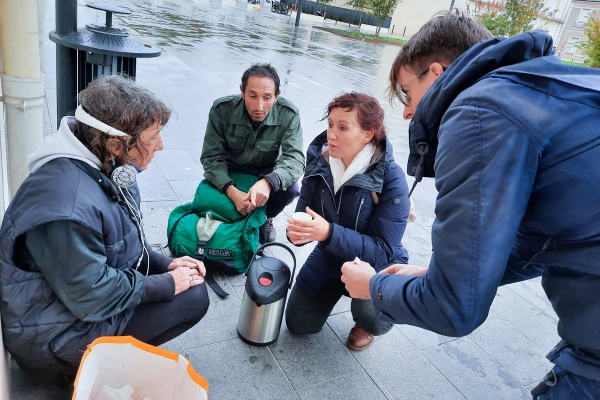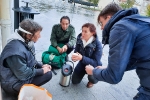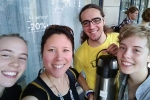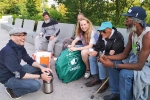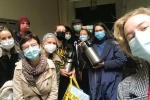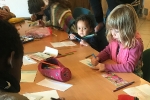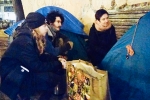“We decided to focus on going as Amma’s volunteers. To unconditionally accept with open hearts everyone we meet,” says Pierre. “We don’t come with much, but we establish relations of trust. We visit on a weekly basis, the same round, meeting the same people. They know they will see us and this forms a bond.”
Known as ‘Les Maraudes’, in this context translated as the roamers, the project is now also active in the cities of Lyon, Marseille, Toulouse, Grenoble, Clermont-Ferrand, Le Havre, Chartres, Lorient, et Dreux. The volunteers work with the constant thought: “What if this were me?”
Teams of about three to four people begin by offering practical items, such as some food, a hot drink, clothing, medical supplies, blankets—even warm hats knit by volunteers. This immediate support helps to achieve an expression of care for people who live in precarious situations.
“We go with simple things—maybe homemade soup with organic vegetables—just to break the ice and establish a link. In this way, many of the people start to really welcome us as we attempt to warm their hearts,” says Pierre.
France has an emergency number, 115, which homeless people can call for immediate temporary shelter. There are also many other homeless support groups that visit the streets with specific objectives: medical assistance, provision of food, access to basic supplies, and so on.
ETW France decided to adopt an approach that would create access to the existing services by establishing continuous relationships with people who are homeless. The volunteers record information about whom they meet and check up on how they are doing.
Once trust is established, the volunteers provide information for the beneficiaries to access resources for their longer term needs. This includes services for the provision of food, shelter, healthcare, and psychological support.
“We simply create a connection with the homeless by listening,” says Lydie, another volunteer. “Amma’s humanitarian work is about love in action, and this is what the world needs. Poverty is humanity’s creation, but a hand held out with a smile, kind listening, sharing some soup—that is also something humanity can create.”
The teams are also connected to social workers who access resources to reintegrate the homeless into society, including government support, housing, education, and job training. But often the homeless people they meet say they do not trust their social workers, and if that is the case, the volunteers maintain the relationship and try again next time.
“They have a right to say no. We can’t force anything. We explain that we’ll be here. We say, ‘You are fed up? I understand,’” says Pierre.
The volunteer work requires training, as there are some risks involved with working on the streets. Every team has someone who keeps an eye on the surrounding environment and signals next steps. Most homeless are in a state of distress and sometimes exhibit aggressive behavior. Substance abuse is a common issue and that also has to be assessed with each interaction.
Hervé says that, at first, the volunteer work was intimidating. “In the beginning, I was stuck in my own thoughts and made myself the priority! Now I understand that being sincere, authentic, and settled in the heart makes this intimidation go away. During these meetings, we are one. If this impression of unity fades, it is because the head has regained the upper hand over the heart.”
The project maintains a practical approach based on the do’s and don’ts of interacting with the homeless. Each new participant studies manuals created by Les Maraudes that are based upon documents from the French government. The work in the streets begins with experienced team members. Volunteers need to make a clear decision whether this is an activity that is truly for them, as the tasks require people who are grounded.
“Sometimes the behavior of the homeless may be rude. When we are stressed out, we go into our rooms and close the door. These people have no doors,” says Pierre.
“Our volunteers need to learn how to manage these behavioral interactions and the impact it may have on themselves. To interact with the homeless is seen as a taboo by some, and sometimes people get scared. Sometimes volunteers are also afraid they will not say or do the right thing. So we have psychologists in place to support the volunteers when they need help.”
Les Maraudes has also created an overall volunteer network that meets once a month online to support each other, and once a year, they hold an in-person retreat at the Centre Amma, Ferme du Plessis in Pontgouin, Northern France.
Over the years, some other innovative approaches have come to life. In Chartres, a partnership started with the area’s social workers to bring homeless people to the Pontgouin Centre for one-week retreats. In Dreux, two volunteers work with one social worker to help reintegrate people back into society.
“The people we meet are very happy. We don’t have much to give, but the homeless we care for say we are making a big difference in their lives. But really, it is we who benefit the most. When we are marauding, we feel so good. We are transformed. It is changing our lives,” says Pierre.
Les Maraudes is an initiative that does not require many physical resources, as mostly what is needed is time. If you are interested in establishing a similar project for the homeless in your area, you are welcome to be in touch:
This email address is being protected from spambots. You need JavaScript enabled to view it.
Photo 1: Teams of about three to four people begin by offering practical items, such as some food, a hot drink, clothing, medical supplies, and blankets.
Photo 2: Once trust is established, the volunteers provide information for the people they meet to access resources for their longer term needs.
Photo 3: Volunteers create a connection by listening carefully to what the homeless people express.
Photo 4: During COVID-19, volunteers took all precautions to continue the work.
Photo 5: Children participate by making cards and drawings for the people the teams will meet.
Photo 6: The volunteer work requires training, as there are some risks involved with working on the streets.



